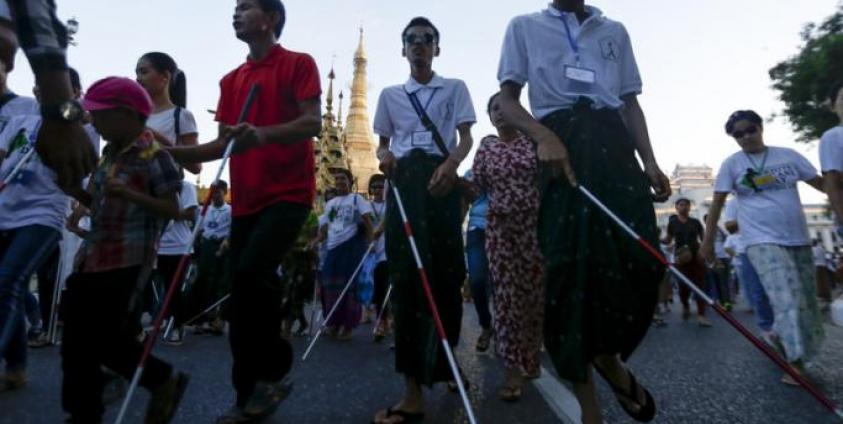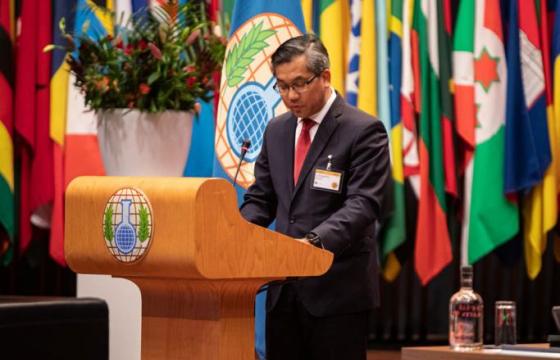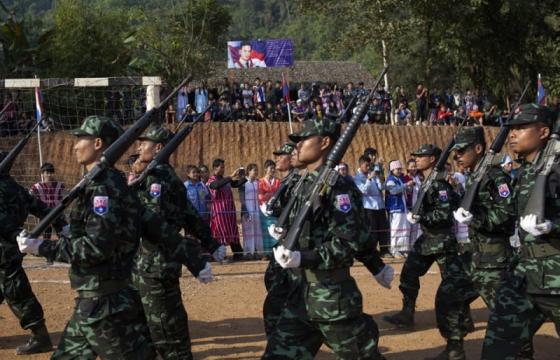Seeing blind people singing and begging for money is not an uncommon sight in Myanmar.
They are likely to appear the most prominent example of a neglected sector of society – the “disabled” or the “differently abled”.
There is little wonder in a society that is attempting to develop economically and culturally after decades of military regime mismanagement that those on the bottom rungs have a particularly hard time, in part because they tend to be ignored.
Catering to the needs of the disabled, it would seem, is a luxury afforded to societies now considered “first world” or “developed” but even in Western countries there are challenges.
Myanmar’s neglect of the of the disabled is a pity as the country’s culture tends to have a compassionate streak, largely due to the outreach provided by many of those who practice Buddhism, Islam, Hinduism and Christianity.
Yet the disabled still lag behind – but it is not because of a lack of trying by those who recognize their challenges.
Politicians have sought to rectify a wrong. The Law on the Rights of Persons with Disabilities was enacted on 5 June 2015 by Myanmar’s parliament to halt the discrimination against disabled people.
If census figures can be relied on, the disabled or differently abled make up a significant proportion of the population.
According to the 2019 Inter-censal survey, carried out by the Myanmar government and the UNFPA, the prevalence of disability at the national level is 12.8 per cent in Myanmar. Among them, 6.3 per cent are visually impaired, followed by 4.4 per cent intellectually impaired and 2.4 per cent hearing impaired.
The disability prevalence varies across states and regions where relatively higher rates were reported in Chin (20.6%), Rakhine and Ayeyawady (17.3% each) and Magway (17.0%) while the lowest was observed in Shan (8.6%).
Among the six types of disabilities, the most common type was difficulty in seeing (6.3%), followed by walking or climbing steps (5.4%), remembering or concentrating (4.4%), hearing (2.4%), self-care (1.9%) and lastly, communication (1.6%). The rate was higher among females (13.9%) than males (11.6%).
Visually impaired people in Myanmar are less likely to participate in society and face many challenges in the fields of literature, job search, education access, proper living standards and many other fields.
The last few years have been particularly tough.
“All people are struggling more or less economically due to the COVID-19 pandemic and political crisis, so disabled people are also facing difficulties to earn income. During high infection rates, visually impaired people have struggled to get jobs. Switching to another job is not easy for them. Job opportunities have been scarce, compared to the past,” Ko Min Min (pseudonym), a visually impaired person told Mizzima.
It may not be spoken or written but a common job requirement in Myanmar is the person must not be disabled.
Moreover, the challenge that blind people are facing is the lack of special schools for them. And most of their families are poor. And the parents of blind children typically have a poor understanding of the importance of education.
The president of Myanmar National Association of the Blind, at a workshop for blind people in January last year – just prior to the military coup – said society provides many physical barriers for the blind, including no consumer products suited for blind people and challenges in terms of transportation and functioning in public spaces.
“The challenges in terms of literature for blind people. Unlike other countries, there is no voice recording CD-books, journals and newspapers intended for the blind,” said Ko Min Min, who added that there is no accessible and responsive public space for the blind people.
“Now, [under the political crisis], it is useless for activists to demand accessible public space,” he said.
Even though disabled people are theoretically protected and supported by the Law on Rights of People with Disabilities, there is no effective practical implementation. Consequently, disabled people are less likely to get non-menial jobs.
“As we all are human beings, we ask for a reduction in discrimination. Both abled and disabled people are human beings. It would be better if there was no discrimination,” Ko Min Min said.
“We pitied by abled people. Instead, I would like to get recognized for our abilities and efforts. Though we are disabled, we still have abilities,” he said.






